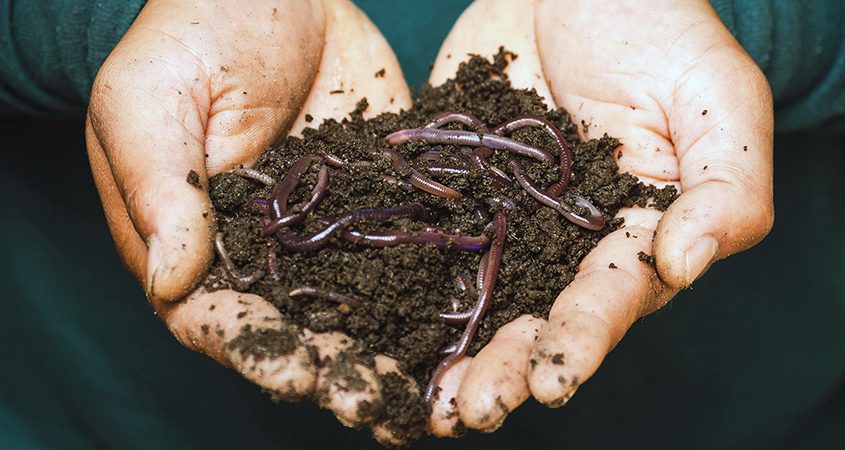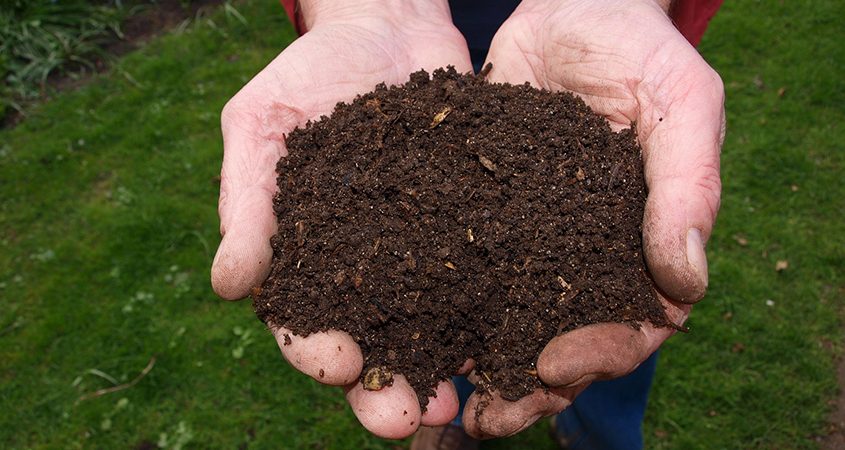 Vermiculture and vermicomposting using earthworms to help you turn kitchen scraps into compost has multiple environmental benefits including the prevention of stormwater runoff. Photo: Sippakorn Yamkasikorn/PixabayCC
Vermiculture and vermicomposting using earthworms to help you turn kitchen scraps into compost has multiple environmental benefits including the prevention of stormwater runoff. Photo: Sippakorn Yamkasikorn/PixabayCCWorms Boost WaterSmart Landscaping
One of the most valuable tools for managing water retention and avoiding stormwater runoff while improving your landscaping soil harnesses the power of worms – earthworks, to be specific.
Vermiculture and vermicomposting are eco-friendly tools using earthworms to transform organic waste into nutrient-rich compost. This process benefits gardeners and the environment.
In the San Diego region, spring’s mild weather is an ideal time to start vermicomposting. Moderate temperatures facilitate optimal worm activity and compost processing. During the hotter summer months, compost bins must be kept in cooler, shaded areas to prevent overheating and ensure worm survival.
Vallecitos Water District 2023 Landscape Contest winner Dean Williams of Carlsbad is a big believer in vermiculture and vermicomposting. In this video, he shows how easy it is to learn how to put worms to work in your landscaping.
Understanding Vermiculture and Vermicomposting
Vermiculture refers to the cultivation of earthworms. The normal activity of earthworms breaks down organic waste. The result is vermicompost, also known as worm castings, a highly nutritious form of compost.
Vermicomposting is the practice of using earthworms to convert organic wastes into high-quality compost and worm castings. This method is an efficient, odorless, and space-saving way to recycle kitchen scraps, keeping them out of landfills where they contribute to greenhouse gas emissions and climate change.
How Using Worms Works

Adding common kitchen food waste to your vermicomposting system keeps it out of our landfills where it produces greenhouse gases. Photo: Sarah Chai/Pexels
As the video shows, setting up a vermicomposting bin is simple and can be done indoors or outdoors. The bin is stocked with material such as shredded newspaper, cardboard, or coconut coir and stocked with earthworms. When organic waste is added, such as food scraps, weeds, or plant trimmings, the worms digest this material and convert it into compost.
Recommended types of worms for vermicomposting are red wigglers (Eisenia fetida) and red earthworms (Lumbricus rubellus). Both thrive in compost bins and are efficient at processing waste.
Vermicomposting’s Environmental Benefits

Nutrient-rich compost produced by vermiculture helps soil retain rainwater in your garden, preventing it from picking up pollutants and washing them into storm drains. Photo: Pixabay/CC
Vermicomposting helps protect the watershed and preserves soil in several ways.
- Safe, Nutrient-Rich Soil Amendment: Vermicompost improves soil structure and enhances nutrient availability. It can reduce the need for chemical fertilizers.
- Water Conservation: By improving soil structure and water retention, vermicompost helps conserve water.
- Stormwater Runoff: Healthy, vermicompost-amended soils absorb water more efficiently. It lessens the amount of runoff washing pollutants into watersheds.
- Waste Reduction: Vermicomposting diverts organic waste from landfills, helping avoid the production and release of greenhouse gases.
San Diego County Vermiculture Resources
Residents looking for more information and resources can visit the Solana Center for Environmental Innovation website. The Center also holds classes in vermiculture. Check the schedule for available classes.
The County of San Diego also offers information on vermiculture, and offers a compost bin discount program.
Smart Water Management
As vermicompost increases the ground’s capacity to absorb rainwater, it lessens the burden on stormwater management systems. With less water flowing into stormwater drainage systems, vermiculture helps diminish flood risks.
Vermiculture and vermicomposting offer a holistic approach to environmental stewardship for San Diego residents. It’s an easy, practical way for individuals to help preserve resources, enhance soil health, and support sustainable gardening. Vermiculture and vermicomposting offer simple tools to confront the challenges of climate change, including risks to our region’s long-term water supply.



